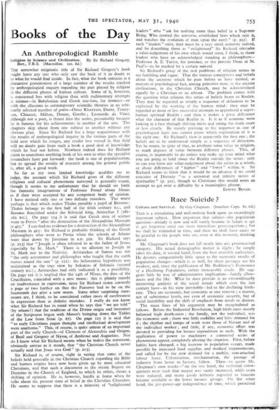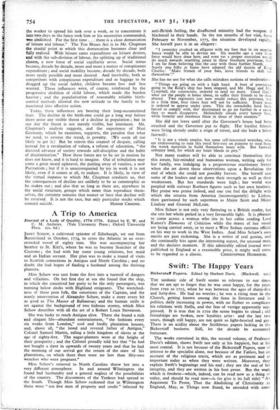Race Suicide ?
Culture and Survival. By Guy Chapman. (Jonathan Cape. 8s. 6d.)
THIS is a stimulating and well-written book upon an exceedingly important subject. How important that subject—the population question—already is now and will surely become in future is apt tc get forgotten amid our more immediate preoccupations ; but we shall be reminded in time, and then we shall have cause to be grateful to the people who are, even at this moment, thinking ahead.
Mr. Chapman's book does not fall neatly into any preconceived category. His actual demographic matter is slight ; he simply takes his data, at second hand, from the best available authorities. He devotes comparatively little space to the economic results of population changes—which is as well, for these passages are his weakest, and, since the publication of Mr. Reddaway's Economics of a Declining Population, rather inexcusably crude. He sug- gests little by way of administrative implications—family allow- ances and the like. What he does provide is an extraordinarily interesting analysis of the social trends which over the last century have—in his view inevitably—led to the declining birth- rate. They are economic, but economic at one remove ; a matter, not of subsistence levels, nor even of economic security, but of social instability and the shift of emphasis from needs to desires.
The main lines of his argument may be recapitulated as follows. Before the Industrial Revolution, high birth-rates merely balanced high death-rates ; the family, not the individual, was the economic unit ; there was little mobility and little demand for it ; the rhythm and tempo of work were those of Nature and of the individual worker ; and little, if any, economic effort was devoted to providing for leisure expenditure as such. With the application of power to machinery a connected series of phenomena appear, completely altering the situation. First, before habits have changed, a big increase in population occurs, made possible by increased food supplies and medical improvements, and called for by the new demand for a mobile, non-attached labour force. Urbanisation, mechanisation, the passage of industry from home to factory, follow. Then—to quote Mr. Chapman's own words—" on the one hand, the technical conse- quences were such that output was vastly increased, while costs were reduced, and many goods hitherto regarded as luxuries became available to the lower income groups. On the other hand, the pre-power-age independence of time, which permitted the worker to spread his task over a week, or to concentrate it into two days as the fancy took him or his necessities commanded, was abolished. For the first time . . . there is a close demarcation of leisure and labour." The Ten Hours Act is to Mr. Chapman the crucial point at which this demarcation becomes clear and fully realised. With leisure came expenditure on leisure desires, and with the sub-division of labour, the splitting up of traditional classes, a new force of social capillarity arose. Social status became, decade by decade, more and more a matter of conspicuous expenditure ; and social mobility became, decade by decade, both more easily possible and more desired. And inevitably, both as competitors with conspicuous expenditure and as luggage to be dragged up the social ladder, children became less and less wanted. These influences were, of course, reinforced by the progressive abolition of child labour, which made the burden heavier ; and the popularisation of reasonably reliable birth- control methods allowed the new attitude to the family to be translated into effective action.
Today, these influences are bearing their long-accumulated fruit. The decline in the birth-rate could go a long way before there arose any visible threat of a decline in population ; but in our day the threat is not merely visible, but imminent. Mr. Chapman's analysis suggests, and the experience of Nazi Germany, which he examines, supports, the paradox that what we need, to reverse the trend, is poverty. (We seem all too likely to get it.) But he rejects this counsel of despair, calling instead for a revaluation of values, a reform of education, " the directed advance of society towards self-discipline and the habit of discrimination." How these forces are to be set in motion he does not know, and it is hard to imagine. Out of tribulation may come a great moral upheaval, the putting away of vanities, a new Puritanism ; but if it is unaccompanied by joy in work it is not likely, even if it comes at all, to endure. It is likely, in view of the virtual impasse to which Mr. Chapman conducts us, that the consequences of decline are unlikely to be as catastrophic as he makes out ; and also that so long as there are, anywhere in the social structure, groups which more than reproduce them- selves, the certainty remains that sooner or later that decline will be reversed. It is not the race, but only particular stocks which































 Previous page
Previous page